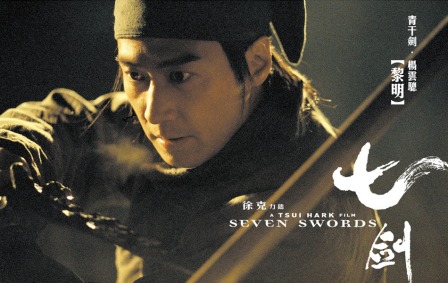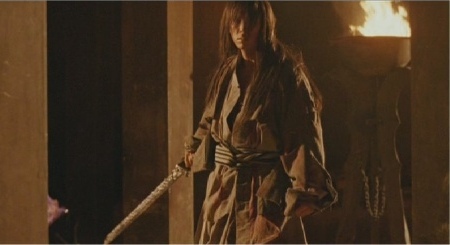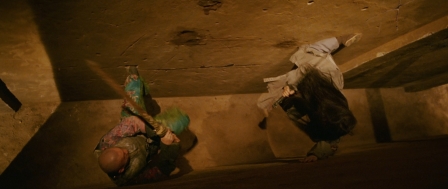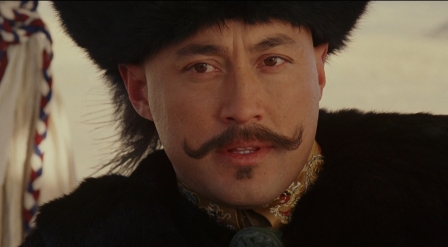January 24th, 2011
The Occasionally Magnificent Seven

Despite my professed love for Hong Kong cinema, sometimes a movie slips through the cracks. For some odd reason, I never got around to watching Tsui Hark’s 2005 wuxia epic, Seven Swords, even though I’ve owned the movie since it was first released on DVD quite a few years ago. I gave the movie a try one weekend when I lived in Hawaii, but I seem to remember being somehow vaguely put off by the look of the film (or, more likely, the running time of 2.5 hours when I had a master’s project to finish) and moved on to other Hong Kong movies that had captured my interest in a way Seven Swords didn’t.
Recently, I had a chance to finally watch Seven Swords, and in retrospect, I wish I hadn’t waited so long, as Hark delivers a mostly entertaining, if overstuffed swordplay epic. It’s not one of Tsui’s best, but it’s a film that’s rousing in small passages, coasting on a handful of intriguing characters and some stellar wuxia iconography that it never quite capitalizes upon.
You can read Kozo’s full critique of the film here, while I share my thoughts below.
Some reports indicate that Tsui Hark’s initial cut of Seven Swords was four hours long before being brought down to a more manageable, but still difficult to endure 153 minutes. I have no idea if the four-hour cut is actually superior to the theatrical release, but I would hope that in the longer edit each of the major characters is given a little more much-needed breathing room. As it stands, Seven Swords doesn’t really let us get to know all the seven sword-bearers very well, as the film is burdened with a variety of messy subplots, backstories galore, and uninteresting love triangles that lack a significant payoff by film’s end. Late in the story, Seven Swords also seems to rely on momentary flashbacks to moments that occurred DURING the events of the film, but were for some reason not shown, which suggests to me that more than a few scenes were rearranged and repurposed for the theatrical cut, rather than just deleted whole cloth in post-production.

Donnie Yen (1 of 7 Swordsman, Collect ‘em All!)
Whatever the real editing situation may be, Seven Swords isn’t exactly the Chinese version of The Seven Samurai that the filmmakers might have wished it to be. Although it may be unfair to compare Tsui’s film to a masterpiece of international cinema, part of the reason why The Seven Samurai, which is three hours long, moves along at a brisk pace is because director Akira Kurosawa was able to delineate big moments for each of his seven main characters, making them not only easily identifiable to the audience, but compelling as individuals. Seven Swords, however, really should have been called 3.5 Swords, as handful of its crew of supreme swordsmen don’t seem that important to the main narrative.
In terms of his appearance alone, Leon Lai’s Yan Yunchong is probably the most iconic swordsman of the bunch, reminding us of many cinematic and literary wuxia heroes. His tragic backstory is perfect for a film like this, and I would have loved to see it amplified in a more pronounced way. Donnie Yen plays a long-haired Korean-of-few-words named Zhu Chaonan, who pulls double duty as passionate romantic lead and badass swordsman supreme. His love story with an enslaved Korean beauty named Green Pearl ( Kim So-Yeon) is surprisingly effective, despite Yen having to be dubbed for their scenes together. Rounding out the more memorable swordsmen of the bunch are Lau Kar-Leung, who holds his own as a former executioner trying to atone for his sins, and Charlie Young, who shows some potential as a novice swordswoman (hence the .5), Yuanyin, with eyes for Yan Yuchong, but unresolved issues with one of the other seven swordsmen. The rest of the group, unfortunately, barely register as characters. I can’t recall anything that Mulong (Duncan Chow), Xin Longzhi (Tai Li-Wu), and newbie Han (Lu Yi) did of any real significance or interest in the film, aside from engage in swordplay violence and, in the case of Han, be one part of a the barely-there love triangle (or, pentagon, as it were)

But again, I think the presence of Leon Lai and Donnie Yen really keep the proceedings interesting, and when their characters finally get to let loose as swordsman in the final battle, it’s a rousing sequence to watch. There’s even a nifty sword battle in a narrow hallway (pictured above) between Yen and Sun Hong-Lei that brought back fond memories of the wonderful crawlspace fight between Jet Li and Zhao Wen-Zhou in Fong Sai-Yuk.
While I understand that the film is based on Liang Yusheng’s novel, Qijian Xia Tianshan, Tsui Hark did substantially depart from the events of the source text. Although perhaps he was intrigued by the idea of seven warriors, I think the film might have been more successful if it had focused primarily on those 3.5 swordspeople I mentioned, as their stories are the most compelling of the bunch — largely because they have stories, unlike the others. It also wouldn’t have hurt to whittle this movie down to somewhere between 90 and 120 minutes. If Seven Swords had something approaching the quality of content as well as the pacing of longer films like The Seven Samurai, The Godfather or The Lord of the Rings, I wouldn’t even suggest cutting it down, but as it stands, Seven Swords just sort of trudges along between little moments of excitement or intrigue.
Although the film has a definite ending, it leaves ample room for a sequel as the surviving characters announce their next mission at story’s end. Some reports indicate that Seven Swords is/was meant to be the first installment of a hexalogy, although whether those plans are still in the works remains unclear. I might be proven wrong, but I just don’t see it happening.
Even if Seven Swords had been a hugely successful film both commercially and critically, the idea of making a series of six films isn’t ambitious, it’s unrealistic. Who’s going to fund all these films? How are you going to keep the same cast for six installments? And how often are you going to make these films? Unless you’re George Lucas, a six film saga based on an unproven property seems like a recipe for failure. One need only look at The Golden Compass and The Chronicles of Narnia as examples of flailing big screen epics that may never be “completed” on the big screen. And yet, if Tsui Hark — the man responsible for some of my favorite films of all-time — wanted to revisit the world of Seven Swords, who am I to argue? I just wonder if there are bigger plans in store for this character:

Michael Wong IS Prince Dokado in Seven Swords 2!


January 24th, 2011 at 2:42 pm
Their is the tv series filmed at the same time by the same company that covers most of the book’s story. I believe that some of the tv show was directed by Clarence Fok.
January 24th, 2011 at 9:20 pm
Yeah, I’ve been wanting to check it out. Netflix has the entire series available; I may have to rent it one day.